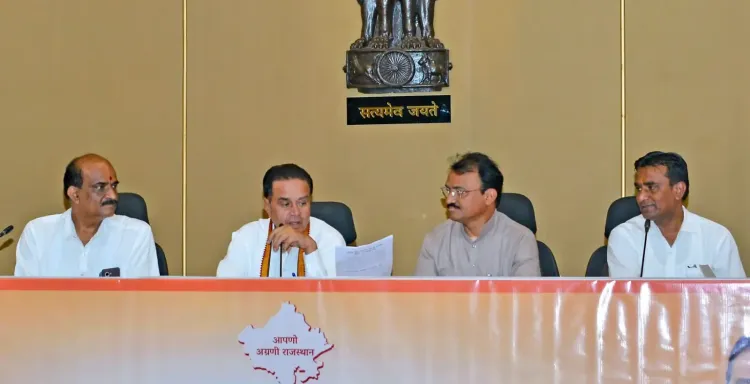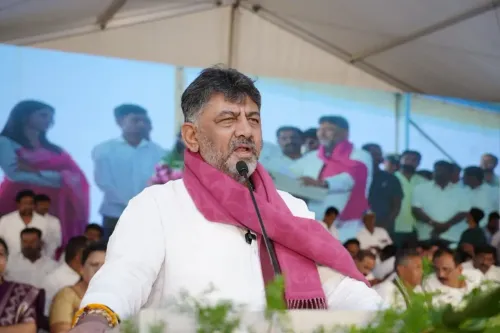Has the Raj cabinet approved the sports university bill and eased pension rules for families of deceased government employees?

Synopsis
Key Takeaways
- Maharana Pratap Sports University to foster sports talent.
- Revised NRI fee structure to attract international students.
- Enhanced family pension provisions for deceased personnel's families.
- Amendments to service rules for better career growth opportunities.
- Commitment to renewable energy with solar power projects.
Jaipur, Sep 19 (NationPress) During a cabinet meeting at the Chief Minister's Office on Friday, significant decisions were made, including the endorsement of the Maharana Pratap Sports University Jaipur Bill, a revision of the NRI quota fee structure in RajMES medical colleges, and a simplification of family pension policies for parents and disabled children of deceased personnel. Amendments to various service rules have also been approved to enhance promotional opportunities for government employees.
Deputy Chief Minister Dr. Premchand Bairwa announced the cabinet's approval of the draft for the Maharana Pratap Sports University Jaipur Bill, 2025, which will be introduced in the upcoming Legislative Assembly session. This university, first announced in the 2024-25 state budget, is set to promote sports and physical education, offering scientific training with cutting-edge equipment to develop elite coaches and sports experts.
The university will focus on sports science, technology, and performance analytics, aiming to enhance athlete performance and conduct research in the field. With world-class sports infrastructure, it aspires to become a Centre of Excellence aligned with the National Education Policy, nurturing Rajasthan's sports talent to reach international standards.
The cabinet also revised fees for NRI quota seats in medical colleges under the Rajasthan Medical Education Society (RajMES). Starting from the 2025-26 academic session, NRI fees will be set at 2.5 times the management quota fees, totaling approximately Rs 23.93 lakh per year. This adjustment aligns with the average costs in private medical colleges, making RajMES institutions more competitive.
This change is expected to fill vacant NRI seats, attract talented NRI students, and generate around Rs 45 crore in additional annual revenue for the RajMES Society.
Currently, RajMES medical colleges have a seat allocation of 50% under the government quota, 35% under the management quota, and 15% under the NRI quota. The previously high dollar-based fee structure, which reached up to Rs 31 lakh annually, resulted in numerous vacant seats, which were often converted to lower-fee management quota seats, leading to revenue losses.
Significant amendments to the Rajasthan Civil Services (Pension) Rules, 1996 were also approved to improve family pension benefits. Parents of deceased government employees will now receive an enhanced family pension of up to 50%, replacing the previous 30% provision, and disabled sons and daughters of deceased personnel will continue to receive family pension even after marriage, as per amendments to Rule 67.
These changes aim to provide more inclusive and compassionate support to the families of government personnel.
Additionally, various amendments to service rules were approved to enhance career growth and streamline promotions. The Rajasthan Tourism Service Rules, 1976 were modified to facilitate promotions to the newly created post of Senior Additional Director, marking the fourth promotional level within the cadre. The Rajasthan Archaeology and Museums Service Rules, 1960 were also amended to include the newly created post of Joint Director (Pay Level-18).
State Parliamentary Affairs Minister Jogaram Patel reported that the cabinet also approved land allotment at a conditional rate for 5,200 MW solar power projects, expected to boost renewable energy production and generate local employment opportunities across the state.
These cabinet decisions underscore the government’s commitment to advancing sports, improving welfare provisions for employees' families, enhancing public service careers, and promoting sustainable development through renewable energy.










